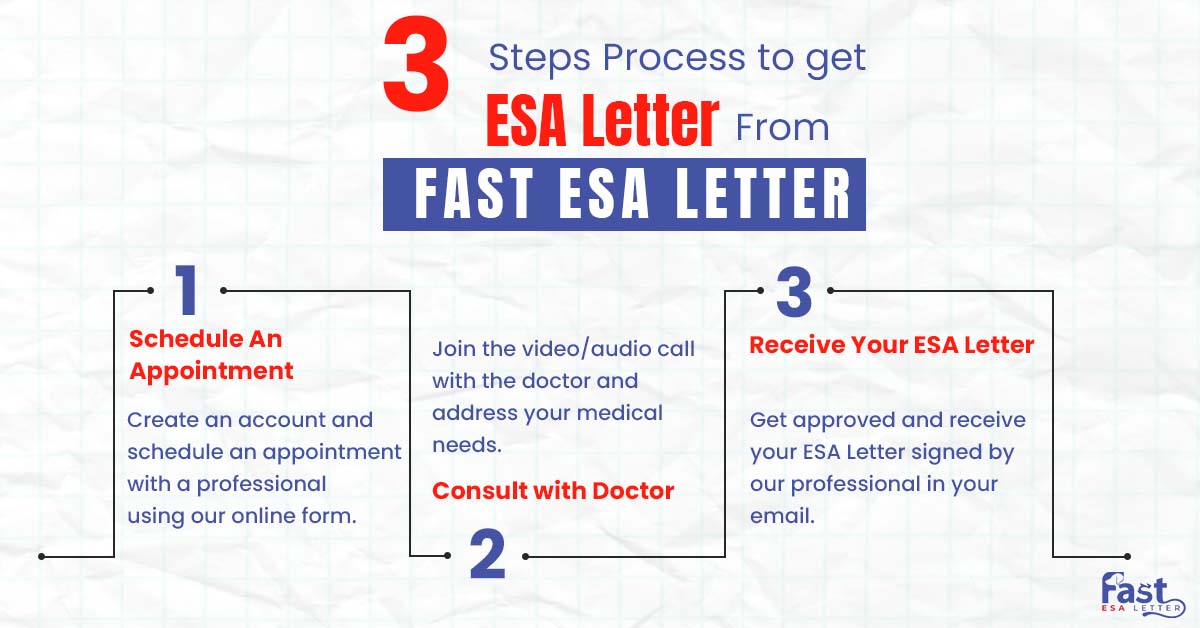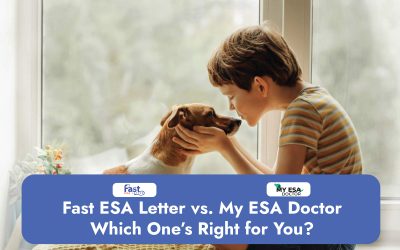Emotional Support Animal Certification: What You Need to Know?

In a world where mental health challenges are becoming increasingly common, Emotional Support Animals (ESAs) have emerged as a vital source of comfort and emotional stability. A certified emotional support animal refers to an ESA with proper documentation.
However, proper documentation is essential to fully benefit from the legal protections and rights associated with an Emotional Support Animal. Without it, you may face challenges securing housing or accessing the support you need.
This blog is your comprehensive guide to the proper documentation for an Emotional Support Animal. We’ll walk you through everything you need to know, from understanding Emotional Support Animal certification to the step-by-step process of obtaining an ESA letter.

Key Points
- The term “ESA certification” is misleading because there is no officially recognized certification for emotional support animals (ESAs). ESA registration is also misleading and holds no legal standing.
- Instead of ESA certification, you only need to obtain an ESA letter from a licensed healthcare professional.
- Discuss your mental or emotional disability and need for an Emotional Support Animal with your healthcare professional. If your need is genuine, the professional will issue an ESA letter.
- With an Emotional Support Animal letter, you can live with your ESA even in pet-restricted buildings. Additionally, you do not have to pay any pet fees that are applied to regular pets.
- While not legally required, many Emotional Support Animal owners use vests or IDs for practical reasons, such as reducing misunderstandings or easing interactions with landlords.
Is There an Official Certification Program for Emotional Support Animals?
I Heard Many Companies Offering ESA Certification—What’s That All About?
If The Certification Is Not Valid, What Documents Do I Need For An Emotional Support Animal?
In place of an ESA certification, the only document you need is an Emotional Support Animal letter from a licensed healthcare professional. This is a recommendation letter that confirms your pet is an emotional support animal and helps you cope with your emotional or psychological condition.
The letter includes details about your diagnosis and how your pet supports your emotional well-being. This letter is the sole document required to secure legal protections under the Fair Housing Act (FHA) for housing accommodations.
What Benefits Will I Receive From an Emotional Support Animal Letter?
- Exemption from pet fees or pet deposits that apply to tenants with pets.
- Exemption from rent related to pets, providing financial relief for ESA owners.
- If you are a student living in a college dormitory, an Emotional Support Animal letter grants you the right to have your emotional support animal with you.
- Your Emotional Support Animal is free from any breed restrictions imposed by housing policies.
Now That I’m Ready To Obtain An ESA Letter, How Do I Get It?
- Appointment: Schedule an appointment with a licensed mental health professional (LMHP). This can be a therapist, psychologist, psychiatrist, or other qualified healthcare provider.
- Consultation: During the consultation, discuss your mental health history, current emotional state, and how an ESA might help you manage your condition. The LMHP will assess whether an ESA is appropriate for your needs. An ESA is a type of assistance animal that provides emotional support.
- Approval: If the LMHP determines that an ESA will benefit your mental health, they will issue an ESA letter. This letter will confirm your qualifying mental health condition and state that your pet provides necessary emotional support.

Can I Get My ESA Letter Online, Or Is An In-Person Consultation Required?
Do I Need Identification, Like a Vest or ID, for My ESA?
With So Many Companies Offering ESA Letters, How Can I Know Which One to Trust?
With numerous companies—both legitimate and fraudulent—offering Emotional Support Animal letters, it can be challenging to determine which ones are trustworthy. Here are five effective ways to verify whether an ESA letter is legitimate and avoid scams:
1. Avoid Instant Certification Claims.
2. Ignore ESA Registries or Certification Databases
There is no such thing as emotional support animal registration or a certified emotional support animal database. Some sites falsely claim that you need to register your ESA, but this is not legally required. The only legitimate documentation you need is a valid ESA letter from a licensed healthcare professional.
3. Verify the Licensed Mental Health Professional
4. Beware of Cheap or Discounted ESA Letters
5. Ensure a Real Consultation Takes Place

Are There Federal Laws Or State Laws That Govern ESA Regulation In My Area?
ESA regulations can vary by state, affecting how emotional support animals are accommodated in housing and public spaces. While federal laws like the Fair Housing Act provide a baseline for ESA rights, some states have additional regulations. For instance, California, Arkansas, Iowa and Montana have specific rules about documentation for housing accommodations.
To navigate these complexities, it’s crucial to consult state-specific resources, or you can also consult Fast ESA Letter. We offer resources and expert guidance to help you understand the specific regulations in your state and ensure you meet all requirements for your emotional support animal.
Additionally, recent changes under the Air Carrier Access Act have affected the status of ESAs, distinguishing them from psychiatric service dogs and impacting airline policies, including fees and travel accommodations.
What to Do If Your ESA Letter Is Denied by a Landlord?
Under the Fair Housing Act, landlords must provide reasonable accommodation for emotional support animals. However, some may refuse to accept your ESA letter. Here’s how to respond:
- Understand Your Certified ESA Letter Rights: The Fair Housing Act prevents discrimination against individuals with emotional support animals. Landlords cannot impose breed restrictions, weight restrictions, or pet policies on ESAs, nor can they charge pet fees, pet deposits, or pet rent for an ESA.
- Ensure Your ESA Letter Meets Certification Requirements: Your ESA letter must be issued by a licensed mental health professional and be up to date. Some housing providers may request an ESA letter annually for verification.
- Educate Your Landlord on ESA Certification Laws: If your landlord is unaware of ESA regulations, provide official resources from the U.S. Department of Housing and Urban Development (HUD) about ESA certification requirements.
- Take Legal Action for ESA Certification Denial: If your landlord refuses to accept your legitimate ESA letter, you can file a complaint with Urban Development or seek legal support to protect your housing rights.
Conclusion

Frequently Asked Questions
Is ESA Certification Legit?
No, there is no official ESA certification. An ESA letter from a licensed mental health professional is all that’s required. This letter confirms your need for an emotional support animal and is the only legitimate document recognized under the Fair Housing Act.
Can An Apartment Ask For My ESA Certification?
No, apartments cannot request ESA certification. However, they can ask for an ESA letter from a licensed mental health professional to verify your need for an emotional support animal.
Do I Need To Register My Emotional Support Animal For The Certification To Be Valid?
No, the ESA letter from a licensed mental health professional is sufficient. Avoid falling into the trap of ESA registration or certification. These are not legally required and offer no additional benefit.
Do Airlines Accept ESA Certification For Travel?
Can ESA Certification Help With Public Access Rights?
Emotional support animals are not protected under the Americans with Disabilities Act of 1990 (ADA). This means that ESA certification cannot grant public access rights or allow your ESA to enter places like restaurants, stores, or other public areas where pets are not allowed.
How Much Should I Pay For ESA Certification?
You should not pay for ESA certification as it is not a legitimate or required document. Pay for an ESA letter only if it’s from a licensed mental health professional. Fast ESA Letter offers its ESA letter service at $149, which includes the required evaluation and documentation from a licensed professional.
Can ESA Certification Improve My Chances Of Getting Approved For An Apartment?
Is ESA Registration Required for Housing?
Can a Landlord Reject My Emotional Support Animal?
How Often Do I Need to Renew My ESA Letter?
Can I Have More Than One Emotional Support Animal?
Can My ESA Live in a No-Pet Apartment?
Do Emotional Support Animals Require Special Training?
Can a College Dorm Deny My Emotional Support Animal?
What If My Landlord Requests Additional Documents?
Can Emotional Support Animals Be Taken on Flights?
Can Emotional Support Animals Be Any Type of Animal?
Post Author
Prince Sharma
Related Articles
Fast ESA Letter vs ESA Pet: Which Service Should You Trust?
Fast ESA Letter vs ESA Pet: Which Service Should You Trust?Both Fast ESA Letter and ESA Pet connect you with licensed professionals, but only one consistently delivers on speed, pricing, and support. If you want an ESA letter without delays, hidden...
Fast ESA Letter vs. My ESA Doctor: Which ESA Service is Right for You?
Fast ESA Letter vs. My ESA Doctor: Which ESA Service is Right for You?Fast ESA Letter and ESA Doctors both facilitate access to licensed mental health professionals for ESA letters. Each service has its own approach, and understanding the differences...
Does Ace Hardware Allow ESA Dogs?
Does Ace Hardware Allow ESA Dogs? Yes, Ace Hardware is widely recognized as a pet-friendly store, and many of its independently owned locations welcome ESA dogs. As long as your emotional support animal is leashed, well-behaved, and under control,...
Live Free with Your ESA!
An ESA Letter Unlocks Freedom!





